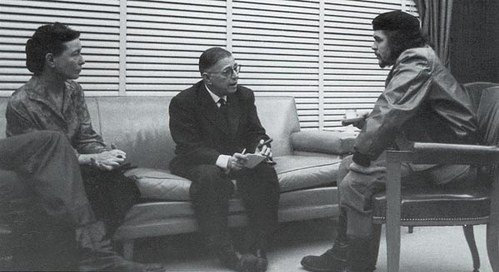"Doing good is good" or how I learned my grandfather maybe was an existentialist
on Archive
I remember when I was a kid and knew I did something good I was always running to my grandfather to let him know about my novel achievements.
Probably because the day after he would have brought me a chocolate or few coins that I could save, but mainly because he had always some good encouraging words for me.
He used to tell me in those occasions “Fare bene è bene”.
A sentence which translates to “doing good is good”. From this picture a bit romantic of my grandfather I like to imagine that he was an existentialist but he didn’t knew it.
Philosopher Jean-Paul Sartre would tell us that doesn’t matter only how we act, but we always “choose” to do it, and we’re responsible for that choice.
For example, you probably were just browsing the web, jumping from a link to another.
Maybe you were just killing your time; maybe with the hope to find the answer to your question; or maybe hoping to be accepted by the people you love.
You had a “choice” to skip this article or to start reading until here. This has been your choice.
Gary Cox starts his book “How to be an existentialist” in a similar way, stating saying that to become an existentialist you don’t need to just read about the theory of the existentialist philosophy from Nietzsche, Heidegger, Sartre or Camus but also start acting taking responsibility of you choices.
Existentialism is rooted in a theory of conscience, but theory and practice are both necessary.
The major learning I took from existentialism is that the individuals are always free to choose. That sometimes it might not be easy choices, there might be unconscious elements, but is always within our possibilities to choose.
Existentialism in practice results in affirming our free will and stop making excuses.
Accepting this responsibility is the one that can start driving us in living a more honest, more just and more moral life.
When we avoid making a choice, in reality we choose to “not choose” and for this we’re still responsible. So we’re not only free of choosing, but condemned to be free to make our choices.
Today we live in a culture of shortcuts, of everything “here and now” that brings us accusing others, the government, the system or everyone else except ourselves.
Part of existentialism in not about having answer to every situation, is also about realizing that we don’t have certainty of many things, but keep doing our choices in a responsible way. Existentialism need to support uncertainty but with a continuous pursue of authenticity and accepting the current situation.
Jose’ Mujica, philosopher, former guerrilla fighter and president of Uruguay said in an interview that for him happiness is “vivir de acuerdo como se piensa” (to live in accordance to how you think). In this perspective to me means to start acting in a way follows our informed choices or for Sartre means to pursue authenticity. Authentic existence involves the idea that one has to “create oneself” and then live in accordance with this self.
Authenticity is not only a personal matter, but it also involves our authenticity in relation to others. One of the ways the individuals avoid responsibility and truth is by keeping themselves in a state of ignorance motivated by fear and anxiety to face reality.
At the core of our freedom is the freedom of choice; and the consequences of choices are our actions. Actions are therefore the result of our human existence.
Sartre wrote “To be is to do” to summarise the importance of actions in existentialism.
It’s part of your choice if we want to learn about existentialism, decide if you want to become an existentialist or ignore it.
Probably my grandfather never had a chance to read about Sartre but he always kept telling me that “good” needs acting in good ways and it is now my responsibility to choose to remember and follow his advice …even if I will not receive chocolates anymore :)
